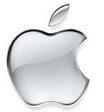 Got an idea for The Next Big Thing?
Got an idea for The Next Big Thing?
You might just be in the right place.
A lot of amazing stuff began here at Berkeley, fully formed or as brainstorms of its creators, to be nurtured wherever they went next.
No trail to follow
Some innovators, like UNIX guru Bill Joy, left early, in the heat of opportunity.
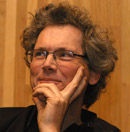
Bill Joy (photo: Peg Skorpinski)
Joy had completed his master’s degree in 1979 and was well on his way to a Ph.D. when he decided the iron was hot. Already something of a legend while a grad student, he left to join three Stanford alums in founding Sun Microsystems. (It was a good gamble: he served as Sun’s chief scientist and CEO during a 21-year career there, pioneering, among many other things, the Java programming language.)
Others followed their original plans first (graduating), then tried the high risk/high reward path, among them Gordon Moore B.S. ’50 and Andrew Grove Ph.D. ’63, who were among the co-founders four decades ago of Intel Corporation, which is now the world’s largest semiconductor chip maker.
Back then, there weren’t any industry-standard business plans to follow for this kind of endeavor, so trail-blazing was the only option.
Help is at hand
Since those days, people have studied what works, and companies, to keep their edge, are happy to work closely with universities and the smart, inventive students that pour out of them. One very positive result is the incubator — which sounds like a warm, fuzzy nursery for newborn humans and baby chicks. Incubators of this sort indeed tend to be nurturing, but also frenetic and highly competitive, much like the startup companies they’re intended to breed.
At Berkeley today, budding entrepreneurs can test their mettle in competitions, team up with like-minded thinkers, bend the ears of faculty and industry experts, and find guidance toward funding, all on campus or very nearby.
The contrast with the build-it-on-your-own-and-alone era could hardly be greater.
Among the many alternatives
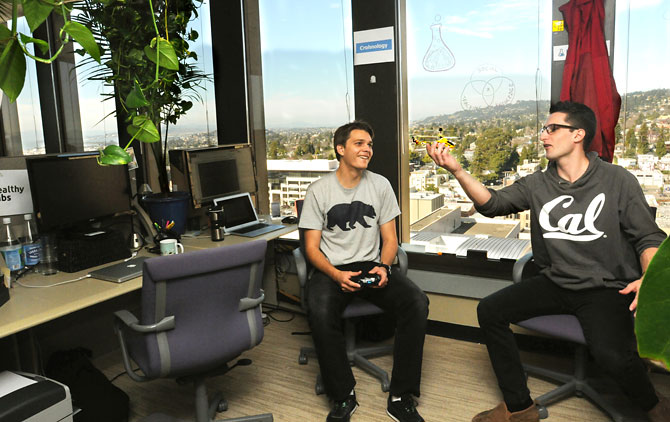
Berkeley’s new Skydeck startup incubator is part of a first-of-its-kind campus collaboration to establish the East Bay as an epicenter of innovation. (Peg Skorpinski photo)
Probably the most spectacular physical example of the new spirit and opportunities is Berkeley Skydeck, a “startup accelerator and technology entrepreneurship center” located, for the aesthetic stimulation of its inhabitants, atop the 13-story former PowerBar Building one block west of the campus, on the penthouse floor, with 360-degree views.
Just over a year since its launch, Skydeck now provides space for offices, mentoring, and workshops for 14 teams from the Berkeley campus. These include:
• HealthyLabs — Helping people with chronic medical conditions connect via social media with other patients around them, discover effective treatments, and share knowledge. Their first product is Crohnology, a network to connect people living with Crohn’s and Colitis.
• GoMake.It – Web platform for collaborators to easily build projects, get exposure, and sell their work.
• Intelligent Obstetrics – Wireless intravaginal medical device for non-invasive diagnosis of preterm birth far before symptomatic labor manifests in pregnancy.
• Building Robotics – Software service that automatically reduces energy use of commercial buildings by optimizing operation of existing building controls already in place.
• Kloudless – Search indexing technology allowing the user to search all documents, emails, and media, whether on your desktop or in the Cloud, from one place.
The high-rise Skydeck enterprise is governed collaboratively by the College of Engineering, the Haas School of Business, and the Office of the Vice Chancellor for Research, partnering with Lawrence Berkeley National Laboratory and the Downtown Berkeley Association. (In January, Skydeck won the Catalyst Award at the first-ever East Bay Innovation Awards celebration presented by the East Bay Economic Development Alliance.)
Some other local magnets for entrepreneurs
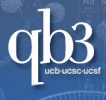 QB3 — the California Institute for Quantitative Biosciences — has a 9,300-square-foot facility nicknamed the Bakery, an innovation center for startup technology companies, with wet labs, fume hoods, bio-safety cabinets, freezers, autoclave, and other specialized equipment. (Note: it actually was a bakery, where Twinkies were made.) QB3 is a consortium of more than 200 laboratories located at UC Berkeley, UC San Francisco and UC Santa Cruz. The other incubators are located at Berkeley’s Stanley Hall (the QB3 Garage), the UCSF campus at Mission Bay (the Mission Bay Innovation Center and the QB3 Garage at UCSF, and at UCSC.
QB3 — the California Institute for Quantitative Biosciences — has a 9,300-square-foot facility nicknamed the Bakery, an innovation center for startup technology companies, with wet labs, fume hoods, bio-safety cabinets, freezers, autoclave, and other specialized equipment. (Note: it actually was a bakery, where Twinkies were made.) QB3 is a consortium of more than 200 laboratories located at UC Berkeley, UC San Francisco and UC Santa Cruz. The other incubators are located at Berkeley’s Stanley Hall (the QB3 Garage), the UCSF campus at Mission Bay (the Mission Bay Innovation Center and the QB3 Garage at UCSF, and at UCSC.
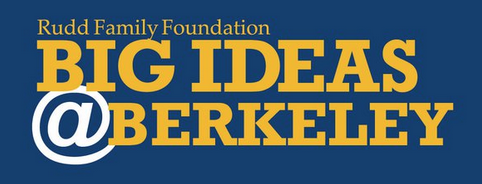 Big Ideas@Berkeley — an annual innovation contest aimed at providing funding, support, and encouragement to interdisciplinary teams of UC undergraduate and graduate students who create innovative and high-impact student projects aimed at solving the world’s most pressing problems. Two out of the three projects featured on the Big Ideas website had grad students at their center. A social venture called Acapio, for instance, won a $10,000 first place scaling-up prize, which will help the Acapio team members get vital data to rural coffee farmers in Latin America.
Big Ideas@Berkeley — an annual innovation contest aimed at providing funding, support, and encouragement to interdisciplinary teams of UC undergraduate and graduate students who create innovative and high-impact student projects aimed at solving the world’s most pressing problems. Two out of the three projects featured on the Big Ideas website had grad students at their center. A social venture called Acapio, for instance, won a $10,000 first place scaling-up prize, which will help the Acapio team members get vital data to rural coffee farmers in Latin America.
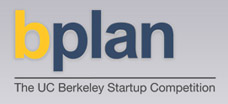 Bplan — the UC Berkeley Startup Competition — has been a student-run program since its inception in 1999. Founded by Melissa Daniels and Keval Desai, a pair of Berkeley-Haas MBA students, it has awarded more than $500,000 in prizes to new startups, including biotech, cleantech, web, IT, consumer goods, and financial services. Bplan’s judges are drawn from many of the area’s top venture capital firms, angel investors, and experienced entrepreneurs.
Bplan — the UC Berkeley Startup Competition — has been a student-run program since its inception in 1999. Founded by Melissa Daniels and Keval Desai, a pair of Berkeley-Haas MBA students, it has awarded more than $500,000 in prizes to new startups, including biotech, cleantech, web, IT, consumer goods, and financial services. Bplan’s judges are drawn from many of the area’s top venture capital firms, angel investors, and experienced entrepreneurs.
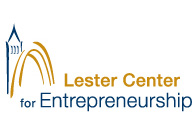 The Lester Center for Entrepreneurship at the Haas Business School is an internationally recognized program and the primary locus at UC Berkeley for the study and promotion of entrepreneurship and new enterprise development.
The Lester Center for Entrepreneurship at the Haas Business School is an internationally recognized program and the primary locus at UC Berkeley for the study and promotion of entrepreneurship and new enterprise development.
 The UCB Startup Fair — a small-is-beautiful event in which students and people from small tech companies can interact without being overshadowed by The Big Names. (The 2013 version will be February 27 in International House.)
The UCB Startup Fair — a small-is-beautiful event in which students and people from small tech companies can interact without being overshadowed by The Big Names. (The 2013 version will be February 27 in International House.)
Who, What, and How Much
![]()
The Berkeley Entrepreneurs and Company Founders Directory is a new effort-in-progress to keep track of the impact of the many for-profit and nonprofit organizations formed by UC Berkeley alumni, faculty, and staff. Know someone who should be included? Have them take the survey!
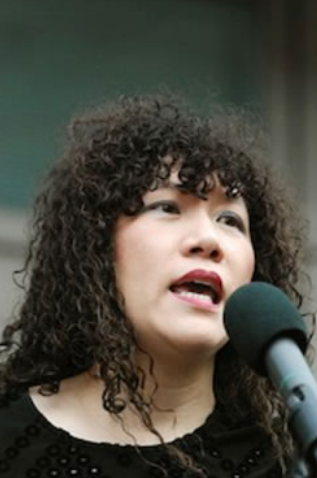
Weili Dai (photo: Peg Skorpinskio)
EECS Entrepreneurial Startups — more specialized than the Founders list above, but currently more populated with data, the Electrical Engineering and Computer Sciences department maintains an extensive compendium detailing companies started by their faculty and alumni, who was involved and how, and the firm’s status (IPO, sold, key numbers, etc.). A few examples: David Culler B.S. ’80 (also an EECS professor), co-founder/CTO of Arch Rock; Kris Pister M.S. ’89, Ph.D. ’92 (also an EECS professor), founder/CTO of Dust Networks; Steve Wozniak B.S. ’86, co-founder of Apple Computer; Weili Dai B.A. ’84, co-founder of Marvell Technology; Sanjay Mehrotra B.S. ’78, M.S. ’80, co-founder/CEO of SanDisk Corporation; Marc Tarpenning B.S. ’85, co-founded Tesla Motors.

— Dick Cortén